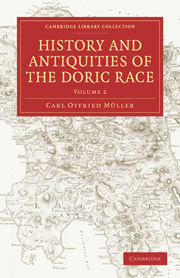Book contents
- Frontmatter
- Contents
- Map
- BOOK III POLITICAL INSTITUTIONS OF THE DORIANS
- CHAP. I
- CHAP. II
- CHAP. III
- CHAP. IV
- CHAP. V
- CHAP. VI
- CHAP. VII
- CHAP. VIII
- CHAP. IX
- CHAP. X
- CHAP. XI
- CHAP. XII
- BOOK IV DOMESTIC INSTITUTIONS, ARTS, AND LITERATURE OF THE DORIANS
- APPENDIX VI
- APPENDIX VII
- APPENDIX VIII
- APPENDIX IX
- Index of subjects
- Index of authors
- ADDITIONS AND CORRECTIONS
CHAP. XI
Published online by Cambridge University Press: 05 August 2011
- Frontmatter
- Contents
- Map
- BOOK III POLITICAL INSTITUTIONS OF THE DORIANS
- CHAP. I
- CHAP. II
- CHAP. III
- CHAP. IV
- CHAP. V
- CHAP. VI
- CHAP. VII
- CHAP. VIII
- CHAP. IX
- CHAP. X
- CHAP. XI
- CHAP. XII
- BOOK IV DOMESTIC INSTITUTIONS, ARTS, AND LITERATURE OF THE DORIANS
- APPENDIX VI
- APPENDIX VII
- APPENDIX VIII
- APPENDIX IX
- Index of subjects
- Index of authors
- ADDITIONS AND CORRECTIONS
Summary
On the civil and criminal law in Doric states.
1. The civil laws, as well as the economy of the Dorians, seem to bear a character of very great antiquity, as far as our scanty means of information permit us to judge. They exhibit strong marks of the early time at which they originated, and it is impossible not to recognise in them a certain loftiness and severity of character. For this reason they were ill suited to the circumstances of the more unrestrained and active manners of later times, and only owed their continuance to the isolated situation in which Sparta succeeded in keeping herself. Thus the law of private property was less definite and settled here than in any other part of Greece in early times, as property was, according to the Spartan notions, to be looked upon as a matter of indifference; in the decrees and institutions attributed to Lycurgus, no mention was made of this point, and the ephors were permitted to judge according to their own notions of equity. The ancient legislators had an evident repugnance to any strict regulations on this subject; thus Zaleucus, who however first made particular enactments concerning the right of property, expressly interdicted certificates of debt: on the contrary, the laws of that early period had a much more personal tendency, and rather regulated the actions of every individual by means of the national customs.
- Type
- Chapter
- Information
- History and Antiquities of the Doric Race , pp. 231 - 246Publisher: Cambridge University PressPrint publication year: 2010First published in: 1830



